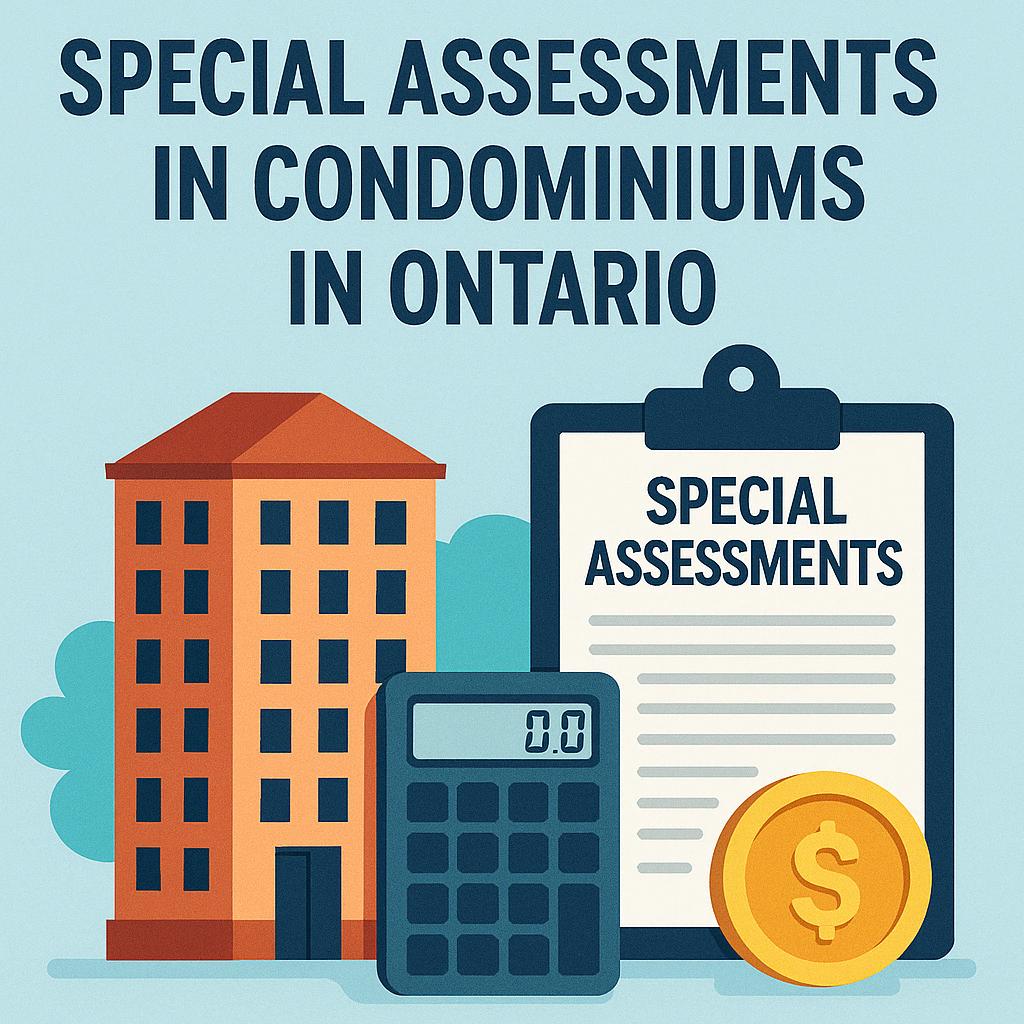A special assessment for a condo owner in Ontario is a one-time extra charge imposed by the condominium corporation to cover unexpected or extraordinary expenses that go beyond what the regular monthly condo fees can cover. This typically happens when the condominium’s reserve fund is insufficient to pay for major repairs, maintenance, or improvements that are necessary for the common elements of the building.
Here’s a breakdown of important aspects of special assessments:
1. When is a Special Assessment Imposed?
• Insufficient Reserve Fund: If the condominium corporation’s reserve fund is not large enough to cover significant costs (such as major repairs or upgrades to the building’s infrastructure), a special assessment may be levied. This could happen if unforeseen damage occurs, if a large project is required, or if the reserve fund has not been adequately funded in previous years.
• Unanticipated Costs: Special assessments are typically used to address emergency repairs or unforeseen costs, like damage caused by a natural disaster, a sudden breakdown of major systems (e.g., the elevator or HVAC), or the need for an unexpected renovation or improvement.
• Capital Improvements: Sometimes, special assessments are used for significant upgrades or capital improvements to common areas that are not part of the regular budget (e.g., a renovation of the lobby, or upgrading the building’s electrical systems).
2. How Much is a Special Assessment?
• The amount of the special assessment depends on the total cost of the repairs or improvements and how many units are in the condominium. The cost is typically divided among all unit owners in a manner determined by the condo’s Declaration or By-laws.
o In some cases, it’s based on the unit size (larger units may pay a higher share).
o In other cases, it might be divided equally among all owners.
• Special assessments can range from a few hundred dollars to thousands of dollars, depending on the scope of the work.
3. Approval Process
• The condominium corporation’s board of directors must approve the special assessment and determine the amount to be levied.
• Once the board approves a special assessment, they are required to notify all unit owners, often in writing, about the amount and the reason for the charge.
• Owners’ Meetings: In some cases, a vote by the owners may be required, particularly if the special assessment is for an amount above a certain threshold.
4. Payment of a Special Assessment
• Once a special assessment is imposed, condo owners must pay their share. This can be done in a lump sum or in installments, depending on the agreement made by the condo board.
• If a unit owner refuses or is unable to pay, the condominium corporation may take action to recover the funds, including placing a lien on the unit.
5. Impact on Condo Owners
• A special assessment can be an unexpected financial burden for condo owners, as it requires a large, one-time payment in addition to the regular condo fees.
• If a special assessment is significant, it could make the property less attractive to potential buyers, as it suggests potential financial instability or costly repairs looming in the future.
6. How to Avoid Special Assessments
• Condo Fees and Reserve Fund Contributions: To avoid the need for frequent or large special assessments, condominium corporations should ensure that their regular monthly condo fees are sufficient to maintain a well-funded reserve fund. This can help avoid the need for special assessments for major repairs.
• Reserve Fund Study: Regular reserve fund studies, required by law in Ontario, help ensure that the condo’s reserve fund is adequately prepared for future repairs and maintenance. A proper reserve fund plan can reduce the likelihood of special assessments.
7. Legal Considerations
• Under the Condominium Act, 1998, the condominium corporation has the legal authority to impose special assessments to cover costs that are not budgeted for in the annual operating costs or the reserve fund.
• Special assessments are typically enforceable, meaning the condo corporation can take legal action to collect any unpaid assessments. This can include placing a lien on the unit, which can lead to foreclosure if the amount remains unpaid.
8. Considerations for Condo Buyers
• Review the Status Certificate: If you are considering purchasing a condominium, it’s important to review the status certificate before buying. The status certificate provides information about the financial health of the condominium corporation, including any outstanding or upcoming special assessments. This will give you insight into potential financial obligations you may face as a new owner.
• Condo Reserve Fund Health: A healthy reserve fund can reduce the likelihood of special assessments, so consider the state of the reserve fund when evaluating a property.
Summary:
A special assessment is a one-time charge imposed on condominium owners in Ontario when the condo’s reserve fund is insufficient to cover major repairs, maintenance, or improvements. This extra fee is meant to address unexpected or large expenses that arise for the common elements of the condo building. Special assessments are divided among unit owners, and the payment amount can vary depending on the scope of the work. Condo owners need to be aware of the potential for special assessments, as they can represent a significant financial burden in addition to regular condo fees.
Are you facing a special assessment? Call Capulli Law to see how we can help you.
